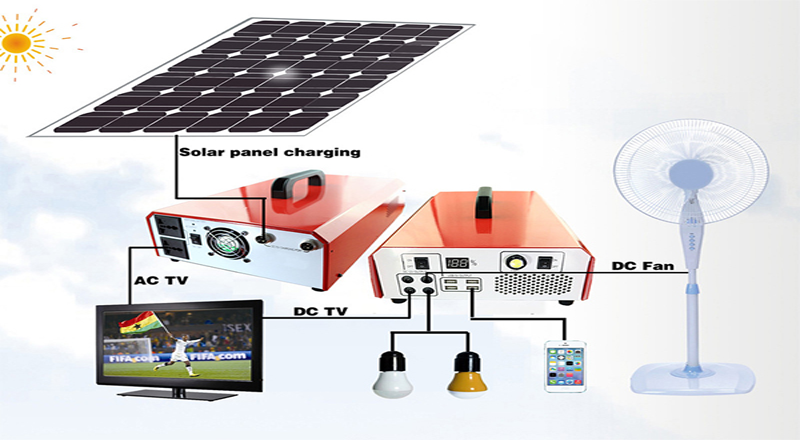Me rritjen e popullaritetit të energjisë së rinovueshme, shumë pronarë shtëpish po mendojnë të instalojnë panele diellore për të ulur faturat e energjisë, reduktuar emetimin e karbonit dhe rritur pavarësinë energjetike. Një nga pyetjet më të zakonshme është: Sa watt panele diellore më duhen për të furnizuar pajisjet e shtëpisë sime?
Përgjigjja varet nga disa faktorë, përfshirë konsumimin e energjisë në shtëpi, llojin dhe numrin e pajisjeve, vendndodhjen gjeografike dhe efikasitetin e sistemit diellor që instaloni. Ky udhëzues shpjegon se si të llogaritni nevojën për panele diellore, me shembuj dhe faktorët që ndikojnë në këtë llogaritje.
Kuptimi i Fuqisë së Panelit Diellor dhe Konsumit të Energjisë
Çfarë është një Watt?
Watti (W) mat fuqinë, dmth sa energji përdoret për sekondë. Në kontekstin e paneleve diellore, watt mat sa energji paneli mund të prodhojë në kushte optimale (diell i plotë). Panelet zakonisht kanë nga 250W deri 400W secili. Sa më i lartë watt-i, aq më shumë energji prodhon paneli.
Kuptimi i Kilovat-Orëve (kWh)
Ndërsa watt mat fuqinë, kilovat-orët (kWh) përdoren për të matur konsumin e energjisë gjatë kohës. Një kWh është energjia e përdorur nga një pajisje 1,000W që funksionon për një orë.
Shembull:
- Një llambë 100W që funksionon 10 orë përdor 1 kWh energji (100W × 10 orë = 1,000Wh = 1 kWh).
- Nëse shtëpia juaj konsumon 900 kWh në muaj, kjo do të thotë një mesatare prej 30 kWh në ditë (900 ÷ 30 = 30 kWh/ditë).
Panelet diellore vlerësohen sipas fuqisë që prodhojnë (watt), dhe energjia e prodhuar matet në kWh. Kuptimi i watt-it dhe i konsumit të energjisë është kyç për llogaritjen e numrit të paneleve që ju nevojiten.
Hapat për të Llogaritur Numrin e Paneleve Diellore
Hapi 1: Llogarit Konsumin Mesatar Ditor (kWh)
Shiko faturën mujore të energjisë dhe ndaji konsumimin total në ditë.
Shembull:
- Konsum mujor: 900 kWh
- Konsum mesatar ditor = 900 ÷ 30 = 30 kWh/ditë
Vlerëso Prodhimin e Panelit Bazuar në Vendndodhje
Prodhimi varet nga:
- Vendndodhja gjeografike: sa diell merr zona juaj (orë dielli).
- Kënd dhe orientimi i paneleve: panelet e vendosura drejt jugut dhe me kënd optimal prodhojnë më shumë energji.
- Efikasiteti i panelit: zakonisht 15%-22%.
Mund të supozojmë 4-5 orë diell të plotë në ditë si mesatare.
Llogarit Prodhimin e Panelit
Prodhimi ditor i një paneli = Watt i panelit × Orët e diellit
Shembull:
- Panel 300W × 5 orë diell = 1,500W = 1.5 kWh/ditë
Llogarit Numrin e Paneleve
Numri i paneleve = Konsumi mesatar ditor ÷ Prodhimi i një paneli
Shembull:
- Konsum ditor: 30 kWh
- Prodhimi i një paneli 300W: 1.5 kWh
- Numri i paneleve = 30 ÷ 1.5 = 20 panele
Pra, do t’ju duhen 20 panele diellore 300W secili për të furnizuar të gjitha pajisjet e shtëpisë suaj.
Shembull me Pajisje të Përditshme
| Pajisje | Konsum (W) | Orë përdorim/ditë | Konsum Ditor (kWh) |
|---|---|---|---|
| Frigorifer | 150W | 24 | 3.6 kWh |
| TV LED | 100W | 5 | 0.5 kWh |
| Larëse | 500W | 1 | 0.5 kWh |
| Lavastovilje | 1200W | 1.5 | 1.8 kWh |
| Klima (Split) | 2000W | 6 | 12 kWh |
| Dritat LED | 5W x 10 | 5 orë | 0.25 kWh |
Konsum total ditor: 18.65 kWh
Me panele 300W dhe 5 orë diell, çdo panel prodhon 1.5 kWh/ditë.
Numri i paneleve = 18.65 ÷ 1.5 ≈ 13 panele
Pra, do t’ju duhen 13 panele 300W për të furnizuar këto pajisje.
Faktorët që Ndikojnë në Llogaritjen
- Efikasiteti i energjisë: Pajisjet më efikase ulin numrin e paneleve të nevojshme.
- Hapësira e çatisë: Çdo panel zë rreth 1.7 m², pra 13 panele do të kërkojnë rreth 22.1 m² hapësirë.
- Moti dhe sezonaliteti: Zonat me pak diell ose dimra të gjatë mund të kërkojnë panele shtesë ose bateri.
- Ruajtja e energjisë (bateri): Për furnizim gjatë natës ose ditëve me pak diell, mund të nevojiten bateri shtesë.
Për të përcaktuar sa watt panelesh diellore ju duhen, duhet të llogarisni konsumimin mesatar ditor të energjisë, orët e diellit në vendndodhjen tuaj dhe efikasitetin e paneleve.
Për një shtëpi që përdor 30 kWh në ditë, zakonisht mjaftojnë 20 panele 300W secili. Duke marrë parasysh faktorë të tjerë si hapësira dhe efikasiteti i pajisjeve, mund të përshtatni numrin e saktë të paneleve. Energjia diellore është një mënyrë efektive për të ulur faturat dhe për të kontribuar në një mjedis më të pastër dhe të qëndrueshëm.




